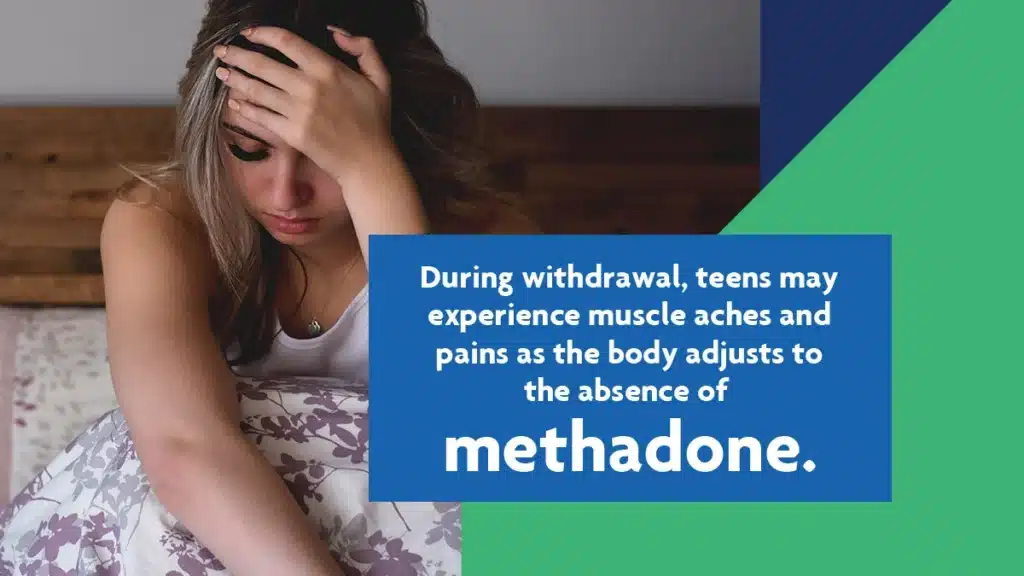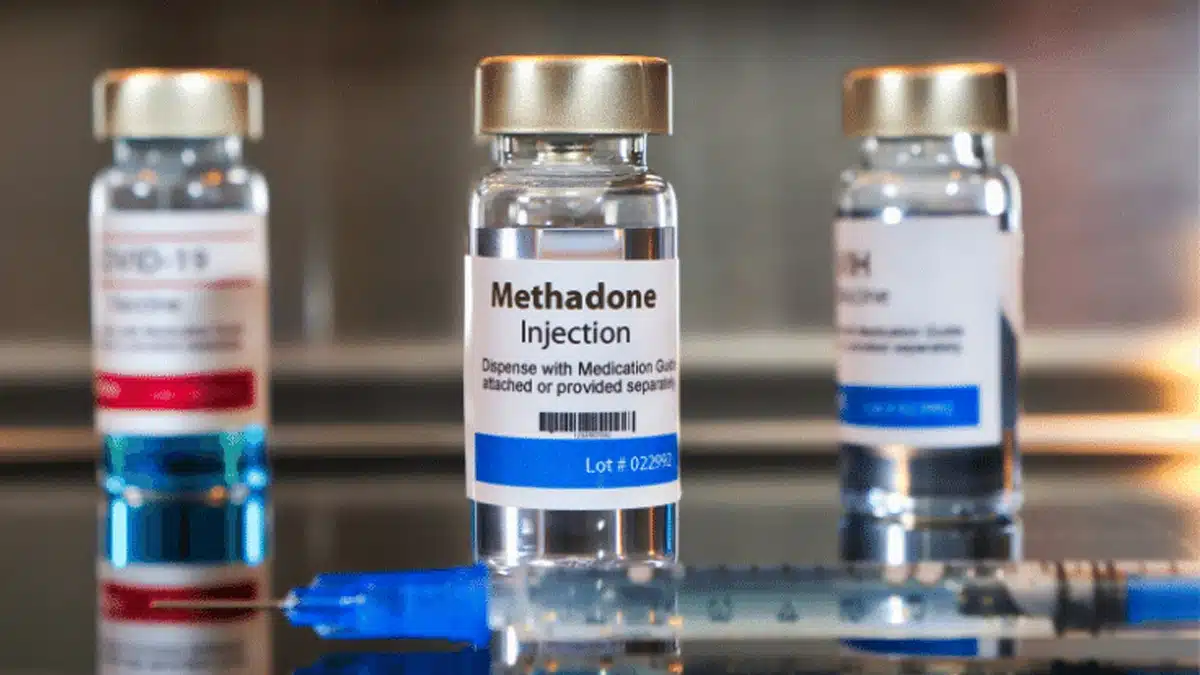Teens and the Lasting Impact of Methadone
Methadone use can have long-term effects on teens. While it helps curb cravings and opioid withdrawal symptoms, it may lead to physical dependence. It means the teen body relies on the drug, potentially resulting in withdrawal if discontinued. Over time, methadone use may impact cognitive functions in teenagers, affecting their memory and attention.
Additionally, its prolonged use can affect the heart and liver. Parents should be aware of potential risks to guide teenagers and consult healthcare professionals to strike a balance between managing opioid dependence and minimizing the long-term consequences of methadone use. Open communication with teens about medication use is vital for informed decision-making.
Key Takeaways
Methadone, a drug, can have long-term consequences for adolescents. Here’s what you need to know:
- Methadone side effects include drowsiness, dizziness, and nausea.
- Teens should know about both the physical and psychological aspects of long-term methadone use.
- There is a potential for cardiovascular issues, impacting the heart, and hepatic concerns, affecting the liver.
- During withdrawal, teens may experience muscle aches and pains as the body adjusts to the absence of methadone.
- Various treatment options play vital roles in addressing methadone abuse, ensuring a comprehensive approach to recovery for teens.
Our teen treatment center provides a compassionate and supportive atmosphere tailored to address the unique needs of adolescents. Contact us at (845) 479-6888 today.
What Is Methadone
Methadone is a medication used to treat severe pain and opioid addiction. While it helps some people manage pain or overcome opioid dependence, there are potential adverse effects.
Methadone can lead to drowsiness, dizziness, and nausea. It may also cause constipation, sweating, and difficulty sleeping. Importantly, improper use or dosage adjustments without medical supervision can be dangerous, potentially leading to overdose or respiratory distress.
Following the prescribed dosage and consulting a healthcare professional for guidance is crucial. Methadone, like other opioids, carries a risk of dependence and addiction.
Abruptly stopping methadone can result in withdrawal symptoms. Parents must realize the importance of open communication with teens to prevent them from getting abused by drugs. They should schedule their time with healthcare providers when considering or using methadone as part of a treatment plan.
Initial Use and Purpose of Methadone
Initially developed in the United States in the 1940s, methadone serves as a medication to manage pain and, later on, opioid dependence. Its primary purpose is to ease withdrawal symptoms and cravings in individuals undergoing treatment for opioid addiction.
Over time, healthcare providers began prescribing methadone as a long-term solution to help individuals maintain abstinence from opioids. Parents need to understand methadone’s historical use and evolution, recognizing its role in addressing opioid-related challenges and its significance in the context of medical treatment.
How It Works on the Body
Methadone operates by binding to the same receptors in the brain that respond to opioids, mitigating withdrawal symptoms and reducing cravings. However, understanding its mechanism is vital, especially considering its potential adverse effects on the body.
Methadone, like other opioid drugs, can lead to physical dependence, wherein the body relies on the drug. This dependence may result in withdrawal symptoms when attempting to discontinue use.
Moreover, prolonged methadone use has been linked with cognitive impairments, affecting memory and attention. Negative impacts extend beyond cognitive functions as there’s a potential for cardiac issues, impacting the heart and hepatic concerns and affecting the liver.
Monitoring by healthcare professionals is vital to address these risks. Teens need to be well-informed about these aspects to strike a balance between managing opioid dependence and minimizing adverse effects.
Medical Uses of Methadone
Methadone serves various medical purposes and is primarily recognized for its effectiveness in managing opioid addiction. It acts on the identical brain receptors as opioids, reducing withdrawal symptoms and cravings.
Additionally, methadone is used for chronic pain management when other pain medications are less effective. Its long-lasting nature allows for less frequent dosing.
However, parents must inform teens of potential concerns. Methadone use may lead to physical dependence, resulting in withdrawal symptoms upon discontinuation.
Prolonged use can impact cognitive functions like memory and attention. Healthcare professionals closely monitor patients to balance the benefits of managing opioid dependence and minimizing potential drawbacks in the United States.
Long-Term Effects of Methadone on Health
Teens should know about both the physical and psychological aspects of long-term methadone use. It can ensure a comprehensive understanding of its effects on health.
Physical Effects
Long-term methadone use may impact physical health. It can lead to physical dependence, where the body relies on the medication, potentially causing withdrawal symptoms if discontinued.
Additionally, there’s a risk of cardiovascular issues, affecting the heart, and hepatic concerns, impacting the liver. Regular health monitoring is crucial to address these potential physical effects.
Psychological Effects
Beyond physical impacts, long-term methadone use may influence psychological well-being. Cognitive functions, including memory and attention, could be affected.
It’s essential for teens and their healthcare providers to be aware of the possible psychological effects and to maintain open communication throughout the treatment process. Balancing the benefits of managing opioid dependence with the potential long-term psychological impacts requires careful consideration and regular assessments.
Risks and Side Effects of Methadone Use
Methadone use, while beneficial in managing opioid dependence, comes with potential dangers and side effects that parents should be aware of.
One notable risk is the development of physical dependence. When the body becomes accustomed to methadone, suddenly stopping it may lead to withdrawal symptoms. In addition to information, there is potential for cardiovascular issues, impacting the heart, and hepatic concerns, affecting the liver.
Common side effects may include exhaustion, dizziness, and nausea. It’s essential to promptly communicate any unusual or severe side effects to healthcare providers.
Psychologically, long-term use might influence cognitive functions, such as memory and attention. Regular check-ups and open communication with healthcare professionals are essential to monitor and manage these effects.
Withdrawal Symptoms of Methadone

Methadone withdrawal can bring about various symptoms. Be aware of the challenges of methadone in the form of withdrawal.
- Nausea and Vomiting: Methadone withdrawal can cause feelings of nausea, potentially leading to vomiting.
- Muscle Aches and Pains: Teens may experience muscle aches and pains as the body adjusts to the absence of methadone.
- Insomnia: Difficulty sleeping, or insomnia, is the most common withdrawal symptom affecting overall well-being.
- Anxiety and Irritability: Feelings of anxiety and irritability may arise during methadone withdrawal, impacting mood.
- Sweating and Chills: Uncontrollable sweating and chills are physiological responses that can accompany withdrawal.
- Diarrhea: Gastrointestinal effects like diarrhea can be prevalent during methadone withdrawal.
- Runny Nose and Watery Eyes: Similar to cold symptoms, individuals may experience a runny nose and watery eyes.
- Increased Heart Rate: The body’s response to withdrawal may include an increased heart rate, contributing to discomfort.
- Yawning: Excessive yawning is a common withdrawal symptom associated with central nervous system adjustments.
Be aware of these withdrawal symptoms to identify and address them promptly with healthcare experts, ensuring a supportive and informed approach to managing opioid dependence in the United States.
Treatment Options for Methadone Abuse
Various treatment options play vital roles in addressing methadone abuse, ensuring a comprehensive approach to recovery for teens.
Detoxification (Detox): Detox is an initial step where individuals gradually stop methadone use under medical supervision to manage withdrawal symptoms.
Inpatient Rehabilitation: Inpatient programs offer a structured environment, combining therapy and medical support to address methadone abuse.
Medication-Assisted Treatment (MAT): MAT involves using FDA-approved medications, like buprenorphine, alongside counseling to assist in methadone abuse treatment.
Outpatient Programs: Outpatient treatment provides flexibility, combining counseling and medical support while allowing individuals to live at home.
Counseling and Therapy: Individual or group counseling is a crucial component in addressing the psychological aspects of methadone abuse.
Parents should explore these treatment options in consultation with healthcare professionals, realizing the importance of comprehensive care to save teenagers from substance abuse.
When to Seek Help
If someone exerts the signs of methadone abuse or misuse, it is vital to seek help from medical professionals. It includes irregular heartbeat, respiratory depression, or cognitive function changes.
Pregnant women in methadone maintenance therapy should especially consult doctors to manage risks, as the use of methadone can affect the unborn. If short-term pain relief turns into long-term opioid use, or if there’s a history of heroin addiction, seeking help from treatment programs is essential to prevent drug abuse.
High-risk situations, such as the misuse of prescription medications or ongoing substance use disorder, necessitate immediate attention from healthcare providers. Awareness and timely intervention are vital to avoid methadone’s long-term effects.
Frequently Asked Questions (FAQ)
Does methadone weaken the heart?
Methadone helps manage opioid dependence, but it can pose a threat to heart health in some cases. Prolonged methadone use may impact the heart, potentially causing irregularities. It is not a universal effect, and the risk varies among individuals.
Research and studies on methadone’s impact on the heart are inconclusive. Its use and potential effects on the heart require careful consideration. If there are concerns about heart health or any other side effects, it’s essential to consult with doctors to make informed decisions about methadone treatment.
What are the long-term physical effects of consistent methadone use?
Methadone, a prescription drug, targets opioid receptors, reducing cravings and withdrawal symptoms. However, it carries risks. Consistent methadone use in opioid addiction treatment, known as methadone maintenance treatment (MMT), affects the body long-term.
Tolerance may develop, leading to higher doses and potential addiction. Long-term use poses health concerns, including liver damage and infectious diseases. Mental health problems and stomach cramps.
While MMT is often part of treatment programs, it has risks. Medical supervision is crucial due to potential life-threatening effects. Understanding long-term consequences is vital for informed decisions about methadone use in opioid use disorder management.
Personalized Teen Recovery Solutions
At our teen treatment center, we transcend addiction challenges, offering a refuge for teens.
Our pioneering methadone treatment, coupled with residential care, forms the bedrock of our holistic approach toward teen recovery. Through expert individual and group therapy, immersive educational workshops, invigorating recreational activities, and soul-nourishing holistic therapies, we dismantle the chains of dependency.
Whether it’s methadone, opioids, or any challenge, our dedicated team stands by your teenager. Contact (845) 479-6888 today, and let us guide your teen toward a future untethered from addiction’s grip.


